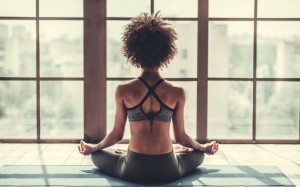 “Yoga is the practice of quieting the mind.”
“Yoga is the practice of quieting the mind.”
With long to-do lists, our lives are anything but quiet. These words, penned by the great sage Patanjali more than 1,700 years ago, offer hope that we can discover peace amid the chaos. While Patanjali is not the founder of yoga, a practice that dates back to 5000 B.C. and beyond, the Yoga Sutras accredited to him provide much of the foundation for the modern art.
And his message has been substantiated repeatedly in the world of exercise and medicine — that yoga is, indeed, beneficial to our mental well-being. It can provide a foundation for self-discovery, relaxation, and stress management. From meditative breathing to forming relaxing and rejuvenating poses, yoga is a strengthening and melding of body and mind to help create a sense of calm and improve overall fitness.
Many studies have shown wide-ranging physical and mental health benefits to yoga. A review in the European Journal of Preventive Cardiology showed that yoga can reduce the risk of heart disease as much as conventional exercise. Another study using magnetic resonance imaging (MRI), found that yoga helps to protect the brain from the decline in gray matter brain volume as we age. Yet another study showed that practicing yoga regularly often leads to better eating and physical activity habits. Other research has shown it helps with sleep quality and quantity, balance, weight loss and overall mental health. As if that isn’t enough, research also shows it can help combat stress, pain and inflammation. Yoga pairs nicely with meditation, which also has many health benefits and can help with stress management. Pretty cool, don’t you think?
One of the most appealing aspects of this form of exercise is that it can be practiced by almost anyone, anywhere. With a wide array of styles available and modifications to nearly every pose, couch potatoes and professional athletes alike can garner the benefits of yoga. You can enjoy — and reap the benefits of — yoga at virtually any age. The research into yoga’s benefits continues to produce more compelling reasons to make room in your schedule for it. A recent study, for example, suggests that yoga is as effective in reducing cholesterol levels and the risk for heart disease as aerobics, cycling, or brisk walking.
Practice yoga with a friend or in a class (in-person or virtually) and you’ll get the benefits of connecting socially with others as well. So, put on your favorite yoga pants (even a comfy pair of sweats will do) and try some basic yoga poses, right in your own home or yard. You’ll be glad you did.








